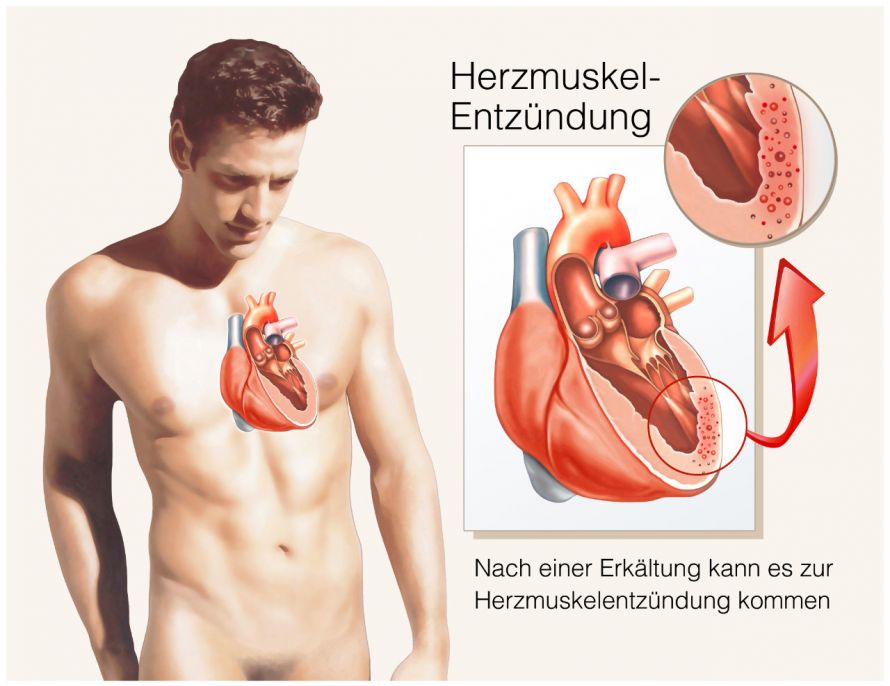What are the causes of myocarditis, what are the symptoms and how can the disease be treated? We answer these questions below. Here you will also find selected doctors who treat heart muscle inflammation.
What are the causes of myocarditis, what are the symptoms and how can the disease be treated? We answer these questions below. Here you will also find selected doctors who treat heart muscle inflammation.
Recommended specialists
Brief overview:
- What is myocarditis? The inflammation of the heart muscle can cause severe discomfort and even be fatal.
- Causes: Viruses, fungi and bacteria can cause the disease, among which staphylococci, streptococci, measles and flu viruses are often prominent. Also autoimmune diseases and infections that have been carried over can also be the cause.
- Symptoms: The symptoms depend on whether the inflammation is acute or chronic. You will find a list of the many symptoms further down in the text.
- Diagnosis: The doctor asks about previous illnesses and carries out a physical examination. A blood count will then show the elevated inflammation levels. Procedures such as an ECG and echocardiography are important, and a myocardial biopsy may also be required.
- Treatment: The patient is prescribed absolute rest. Medication supports the healing process. The illness must be completely cured.
- Prognosis: Heart muscle inflammations that are treated quickly usually heal very well and without consequences. In rare cases, serious heart diseases remain such as cardiac arrhythmias.
Article overview
What is myocarditis and how is it caused?
The development of heart muscle inflammation can have various causes. Sometimes it is triggered by certain viruses, fungi or bacteria, for example. Common pathogens are for example:
- Viruses: Measles viruses, flu viruses or herpes viruses
- Bacteria: Staphylococci or streptococci.
Also Autoimmune diseases can also lead to myocarditis. The immune system turns against its own body and attacks the structure of the heart muscle, among other things.
Carried-over infections are a major source of danger. Athletes in particular often do not properly cure a cold or flu. As a result of this carry-over, the heart muscle can then be damaged.
The heart muscle inflammation often progresses without complications at first. Symptoms either do not occur or are not interpreted correctly by the person affected.
In extreme cases, this can lead to severe discomfort or even be fatal. Not only the diagnosis is important for this disease, but also an individual form of treatment.
The symptoms of myocarditis
The symptoms of heart muscle inflammation are quite varied. A distinction is made between acute and chronic myocarditis.
In the case of acute myocarditis
- Chest pain,
- Heart palpitations,
- Cardiac arrhythmias,
- Shortness of breath or
- Blue discolouration of the skin as well as
- Paleness
may occur. Water retention, so-called oedema, is also one of the symptoms. Then water accumulates in the tissue.
Chronic myocarditis causes other symptoms. Signs can be
- Fatigue,
- Listlessness,
- Weight loss or
- Limb pain
. However, these symptoms also apply to other clinical pictures. Less dramatic illnesses, for example a mild infection, can also lead to aching limbs or general malaise.

Heart muscle inflammation can affect heart function © Henrie | AdobeStock
How does the doctor diagnose myocarditis?
Careful diagnosis is essential for the targeted treatment of myocarditis.
Many sufferers do not notice any symptoms or they occur only sporadically and weakly. Therefore, myocarditis is not always easy to diagnose.
If heart muscle inflammation is suspected, the doctor will carry out several tests.
In the first step, the attending physician will ask the patient about possible pre-existing conditions. Acute myocarditis in particular can sometimes be easily identified in this way. If the patient has recently suffered from
- a flu-like infection,
- a cold or
- a diarrhoeal disease,
these can be the first important signs for the doctor.
In addition, the doctor will also carry out some standard examinations. For example, the doctor will measure blood pressure and body temperature as well as listening to the heart and lungs. A blood test can also help with the diagnosis. If increased inflammation values are found here, these provide a further indication of a possible heart muscle inflammation.
Chronic myocarditis is much more difficult to diagnose.
If the disease takes a severe or even chronic course, a myocardial biopsy may also be indicated. Tissue is removed from the heart muscle and clinically examined.
In addition, other standard procedures are also part of the examinations. These include, among other things, an ECG or an ultrasound examination of the heart. The latter can be performed by a cardiologist who specialises in diseases of the cardiovascular system.
How myocarditis can be treated
Any physical exertion can aggravate an already existing myocarditis and lead to further problems. Therefore, the first priority in the case of myocarditis is to take it easy. Depending on the severity and progression of the disease, this rest can even extend to absolute bed rest.
It is important that the disease is completely cured, otherwise a relapse may occur.
In addition, medication is also indicated as part of the therapy. If the patient has been prescribed strict bed rest, the risk of thrombosis increases. To keep this risk as low as possible, heparin is prescribed. This is a blood thinner that the patient administers to themselves subcutaneously (under the skin) using an injection.
Viral infections are responsible for a large proportion of heart muscle inflammations. Therefore, the doctor can also administer so-called interferons.
If bacterial infections are the cause, antibiotics will help; if fungal infections are present, antimyotics are indicated.
In addition, the following can also be prescribed
- Painkillers,
- Diuretics,
- Heart medication or
- Antiarrhythmics
by the doctor.
Chronic myocarditis can be caused by an autoimmune disease, among other things. Immunosuppressants that restrict the immune system then help here.
The prognosis after myocarditis
As a rule, myocarditis that is recognised in good time and treated appropriately heals without consequences.
In individual cases, slight arrhythmias may remain, although these can also occur in healthy patients. If the disease has taken a very severe course, transplantation might be considered.















